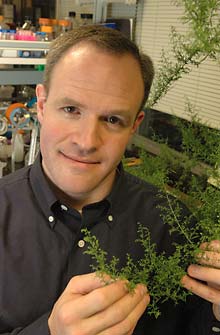
Replacing foreign oil with domestically grown biomass would revolutionize world politics and economies, with states such as Nebraska emerging as potentially huge winners, says a former Clay County farm boy who's now one of the world's leading biotechnology scientists.
Jay Keasling, a professor of biochemical engineering at the University of California, Berkeley, spoke Tuesday on "The Bold Future of Alternative Energy," as the final guest in the 2011-12 Heuermann Lectures at the University of Nebraska-Lincoln.
Using 2009 statistics, Keasling said that of the 94.5 quadrillion BTUs of energy used in the United States, 83 percent came from fossil fuels. The U.S. now imports about half that oil, and those oil imports account for roughly half of the nation's trade imbalance. And, of course, fossil fuels emit high levels of carbon dioxide into the atmosphere.
Future oil shortages are predicted as China and India increase use at a time when oil production is leveling off and dropping. Prices could reach $200 a barrel, doubling the price of gasoline.
Ethanol from corn already is making inroads into that dependence on foreign oil, but that's only part of the answer, Keasling said. Indeed, corn is far from the ideal biofuels crop, since it requires lots of water and fertilizer and also is important as a food and feed crop.
So, other forms of biomass are in development, including switchgrass, which can produce four times the amount of energy it takes to grow it, Keasling noted.
Keasling's research team at the Joint BioEnergy Institute is heavily involved in those efforts. Scientists there engineered a strain of Escherichia coli bacteria to produce biodiesel fuel from biomass such as switchgrass, without the need of enzyme additives. His team now is working to increase the efficiency and speed by which its engineered E. coli strain can be cost-effective and economically competitive in quantities needed to meet the world need.
"We need to rely on dedicated energy crops" such as switchgrass, said Keasling, who received his bachelor's degree from UNL.
"This would be a huge change in our balance of trade, a huge change in world politics," he added, noting that the money now going overseas to purchase oil could be going into economies of farm states such as Nebraska.
Miscanthus giganteus is a particularly promising biomass crop. It's a perennial that grows 12 feet tall; it also fixes nitrogen in the soil. "It looks to be a great crop for the future," Keasling said.
Scientists like Keasling are focusing on making more efficient the process for getting energy out of biomass crops. Sugars – which comprise about 70 percent of plants' content – are the key, but extracting them and processing them is tricky. Goals are to develop plants that contain more of the so-called "good sugars," less of the bad, and fewer lignins, which are organic polymers in plant cell walls that make them rigid and woody.
Research efforts are focused on improving pretreatment processes to remove lignins and engineering plants to have less lignin. "This is a very exciting area of research," he added.
While bioenergy has successfully produced gasoline substitutes, future research also must produce diesel and jet fuel substitutes.
Keasling said he also expects biomass production to result in chemicals from those plant sugars to replace other substances that now come from petroleum.
Responding to a question from the audience, Keasling said government's role in this process will be a "steady hand ... steady policies over many decades" and not playing favorites among the different crops and technologies. "Government shouldn't be picking winners and losers. Let the marketplace do that."
The Heuermann Lectures will resume in the fall, with four former secretaries of agriculture invited to speak about the land-grant university tradition on Sept. 28.
Heuermann Lectures in UNL's Institute of Agriculture and Natural Resources focus on providing and sustaining enough food, natural resources and renewable energy for the people of the world, and on securing the sustainability of rural communities where the vital work of producing food and renewable energy occurs. The lectures feature diverse speakers who are working to meet the world's food and food-related challenges in a variety of fields.
Heuermann Lectures are made possible through a gift from B. Keith and Norma Heuermann of Phillips, longtime university supporters with a strong commitment to Nebraska's production agriculture, natural resources, rural areas and people.
-- Dan Moser
More details at: http://go.unl.edu/xu2